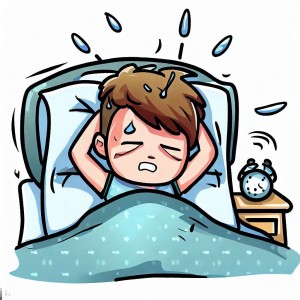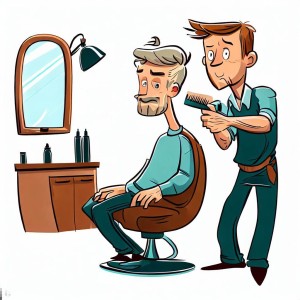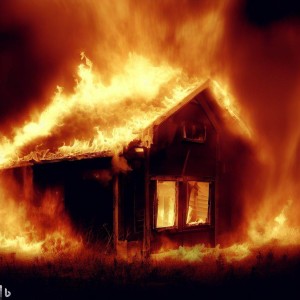Why Do I Wake Up Sweating After a Dream? Strategies for Managing Night Sweats and Improving Your Quality of Sleep

Have you ever woken up drenched in sweat after having a dream? This phenomenon, known as night sweats, is a common experience that affects many people. Various factors, including underlying medical conditions and lifestyle habits, can cause night sweats. This article explores the possible reasons you may wake up sweating after a dream.
I. Introduction
A. Night sweats – A common experience
Have you ever woken up in the middle of the night, drenched in sweat after having a dream? This experience, known as night sweats, is a common phenomenon that affects people of all ages. Night sweats can be distressing and interfere with your sleep, leaving you tired and drained. This article will explore why you may wake up sweating after a dream.
B. Defining night sweats and their causes
Night sweats refer to excessive sweating during sleep that can leave your bedclothes and sheets soaked. This condition differs from normal sweating during hot weather or physical activity. Night sweats can be caused by various factors, ranging from underlying medical conditions to lifestyle habits. Identifying the root cause of your night sweats can help you address the problem and prevent it from recurring.
C. Importance of exploring the reasons behind night sweats
Night sweats can be a symptom of an underlying medical condition or a result of environmental or psychological factors. Night sweats can cause discomfort, disrupt sleep, and affect overall health and well-being if left untreated. Identifying the cause of your night sweats is essential to determine the appropriate treatment and improve your quality of life. The following sections will explore possible medical, lifestyle, and psychological reasons behind night sweats.
II. Possible Medical Reasons for Night Sweats
A. Hormonal Imbalances
Hormonal imbalances can cause night sweats in both men and women. In women, night sweats can occur due to menopause, perimenopause, or pregnancy. Fluctuations in estrogen levels can cause hot flashes and night sweats in women. In men, night sweats can be a symptom of low testosterone levels or an indicator of an underlying medical condition, such as hypogonadism.
B. Infections
Infections can also cause night sweats. Bacterial infections, such as tuberculosis, endocarditis, and osteomyelitis, can cause night sweats. Viral infections, such as HIV, influenza, and hepatitis, can also cause night sweats. Night sweats may also be a symptom of a fungal infection, such as histoplasmosis or coccidioidomycosis.
C. Cancer
Night sweats can be a symptom of certain types of cancer, such as lymphoma or leukemia. Night sweats caused by cancer often accompany other symptoms, such as unexplained weight loss, fever, and fatigue. If you have persistent night sweats, it is essential to consult your doctor to rule out the possibility of cancer.
D. Medications
Some medications can cause night sweats as a side effect. Examples include antidepressants, antipsychotics, hormone therapies, and corticosteroids. If you are experiencing night sweats after starting a new medication, consult your doctor to discuss alternative treatment options.
E. Thyroid Disorders
Thyroid disorders, such as hyperthyroidism or hypothyroidism, can cause night sweats. These conditions affect the function of your thyroid gland, which regulates your body’s metabolism. Night sweats may also be a symptom of thyroid cancer. If you have a thyroid disorder and are experiencing night sweats, it is important to consult your doctor to determine the cause and appropriate treatment.
III. Lifestyle Factors and Night Sweats
A. Stress
Stress is a common cause of night sweats. When stressed, your body releases hormones that can cause your heart rate and body temperature to rise, leading to night sweats. To reduce stress and prevent night sweats, you can try III. Lifestyle Factors and Night Sweats
A. Stress
Stress is a common cause of night sweats. When stressed, your body releases hormones that can cause your heart rate and body temperature to rise, leading to night sweats. You can try relaxation techniques such as deep breathing, meditation, or yoga to reduce stress and prevent night sweats. Regular exercise, a healthy diet, and enough sleep can also help reduce stress.
B. Alcohol Consumption
Alcohol consumption can also cause night sweats. Alcohol can affect your body’s temperature regulation system, causing your body temperature to rise and leading to night sweats. If you are experiencing night sweats after drinking alcohol, it may be helpful to reduce your alcohol intake or avoid drinking altogether.
C. Diet
Your diet can also affect your likelihood of experiencing night sweats. Eating spicy or acidic foods before bedtime can cause your body temperature to rise, leading to night sweats. It is important to avoid eating heavy meals close to bedtime and to opt for lighter, more easily digestible foods instead.
D. Smoking
Smoking can also contribute to night sweats. Nicotine is a stimulant that can cause your heart rate and body temperature to rise, leading to night sweats. Quitting smoking can help reduce the frequency and severity of night sweats.
E. Sleep Environment
Your sleep environment can also contribute to night sweats. Sleeping in a warm room or using heavy blankets can cause your body temperature to rise and lead to night sweats. To prevent this, keeping your bedroom cool and well-ventilated is important. Opting for lighter, breathable bedding can also help reduce night sweats.
IV. Psychological Causes of Night Sweats
A. Anxiety
Anxiety and stress-related disorders can cause night sweats. When you are anxious, your body releases stress hormones that can cause your heart rate and body temperature to rise, leading to night sweats. Treating underlying anxiety disorders with therapy or medication can help reduce the frequency and severity of night sweats.
B. Nightmares
Nightmares can also cause night sweats. Nightmares can be caused by various factors, including stress, anxiety, and post-traumatic stress disorder (PTSD). Treating the underlying cause of nightmares with therapy or medication can help reduce the frequency and severity of night sweats.
C. Post-Traumatic Stress Disorder (PTSD)
PTSD can cause night sweats as a result of recurrent nightmares and flashbacks. PTSD is a mental health disorder that can develop after experiencing a traumatic event. Treatment for PTSD may involve therapy, medication, or a combination of both.
V. When to Seek Medical Attention
A. Persistent night sweats
If you are experiencing persistent night sweats, it is important to consult your doctor. Persistent night sweats may be a symptom of an underlying medical condition that requires treatment.
B. Associated Symptoms
It is important to consult your doctor if you are experiencing night sweats accompanied by other symptoms, such as fever, unexplained weight loss, or fatigue. These symptoms may be indicative of an underlying medical condition that requires treatment.
C. Age and Night Sweats
Night sweats are common in menopausal women and may be a symptom of perimenopause or menopause. However, night sweats can occur at any age and may be a symptom of an underlying medical condition. If you are experiencing night sweats and are unsure of the cause, it is important to consult your doctor.
VI. Prevention and Treatment of Night Sweats
A. Lifestyle Changes
Making lifestyle changes can help prevent and reduce night sweats. This may include reducing stress, avoiding alcohol and spicy foods, quitting smoking, and optimizing your sleep environment. Regular exercise, a healthy diet, and adequate hydration can also help reduce the frequency and severity of night sweats.
B. Medications
If an underlying medical condition causes night sweats, your doctor may recommend medication to treat the underlying condition. Hormone replacement therapy may be recommended for menopausal women experiencing night sweats. Antidepressants and anti-anxiety medications may be prescribed for individuals experiencing night sweats related to psychological causes.
C. Natural remedies
Natural remedies may also help reduce the frequency and severity of night sweats. Some effective natural remedies include black cohosh, red clover, and soy. It is important to consult your doctor before trying natural remedies, as some may interact with medications or have potential side effects.
FAQs
Q: What are night sweats?
A: Night sweats refer to excessive sweating during sleep that can leave your bedclothes and sheets soaked.
Q: What causes night sweats?
A: Night sweats can be caused by various factors, including underlying medical conditions, hormonal imbalances, lifestyle habits, and psychological factors.
Q: Is it normal to wake up sweating after a dream?
A: Waking up sweating after a dream is a common experience that affects many people.
Q: What medical conditions can cause night sweats?
A: Medical conditions such as infections, hormonal imbalances, thyroid disorders, and cancer can cause night sweats.
Q: Can lifestyle habits contribute to night sweats?
A: Yes, lifestyle factors such as stress, alcohol consumption, diet, smoking, and sleep environment can contribute to night sweats.
Q: Are there psychological causes of night sweats?
A: Anxiety, nightmares, and post-traumatic stress disorder (PTSD) can all contribute to night sweats.
Q: When should I seek medical attention for night sweats?
A: You should seek medical attention if you experience persistent night sweats or night sweats accompanied by other symptoms, such as fever, unexplained weight loss, or fatigue.
Conclusion
A. Understanding Night Sweats
In conclusion, waking up sweating after a dream, or night sweats, is a common experience that various factors can cause. Medical conditions, lifestyle habits, and psychological factors can all contribute to night sweats. Identifying the underlying cause of night sweats is crucial for effective treatment and prevention.
B. Importance of Seeking Medical Attention
If you are experiencing persistent night sweats or night sweats accompanied by other symptoms, it is important to seek medical attention. Your doctor can help determine the cause of your night sweats and recommend appropriate treatment options. Ignoring night sweats can lead to discomfort, sleep disruption, and potential health risks if left untreated.
C. Lifestyle Changes for Prevention and Treatment
Making lifestyle changes can also be effective in preventing and reducing night sweats. Reducing stress, maintaining a healthy diet, regular exercise, and optimizing your sleep environment can help reduce night sweats’ frequency and severity. Quitting smoking and reducing alcohol consumption can also be helpful. Your doctor may also recommend Natural remedies and medications to treat night sweats.
Suggested Readings
If you’re experiencing night sweats and looking for more information on the possible causes and treatments, a variety of resources are available. Below are some suggested readings to help you learn more about night sweats:
- “Night Sweats: Unexplained Sudden Sweating During Sleep” by Joseph C. Maroon and Jeffrey W. Dutton. This book provides an in-depth look at the possible causes of night sweats, including medical conditions, lifestyle factors, and psychological causes. The authors offer practical advice for managing and preventing night sweats.
- “Mayo Clinic Guide to Your Baby’s First Year” by the Mayo Clinic. While this book is focused on caring for a new baby, it includes a section on night sweats in adults. The section covers the possible causes of night sweats and offers tips for reducing their frequency and severity.
- WebMD. This website offers a comprehensive guide to night sweats, including information on the possible causes and treatments. The site also features user forums where individuals can share their experiences with night sweats and connect with others experiencing the same symptoms.
- National Sleep Foundation. The National Sleep Foundation offers a guide to night sweats that includes tips for managing the condition and improving your sleep. The site also features articles on the science of sleep and the latest research on sleep disorders.
- “The Hormone Cure” by Dr. Sara Gottfried. While this book focuses on hormonal imbalances in women, it includes a section on night sweats and their possible causes. The author offers practical advice for managing night sweats and improving hormonal balance.
These resources can provide valuable information on the possible causes and treatments for night sweats. It is important to consult with your doctor if you are experiencing persistent night sweats or night sweats accompanied by other symptoms. Your doctor can help determine the underlying cause of your night sweats and recommend appropriate treatment options.






